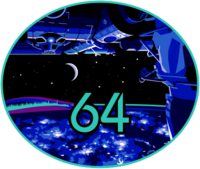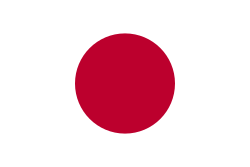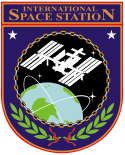Expedition 64
| Expedition 64 | |||
 | |||
| Uppdragsstatistik | |||
|---|---|---|---|
| Rymdstation: | ISS | ||
| Start: | 21 oktober 2020 | ||
| Slut: | 17 april 2021 | ||
| Transport | |||
| Uppskjutning: | med Sojuz MS-17 SpaceX Crew-1 Sojuz MS-18 | ||
| Uppskjutningsplats: | Kosmodromen i Bajkonur Kennedy Space Center | ||
| Landning: | med | ||
| Landningsplats: | Kazakstan | ||
| Kronologi | |||
| |||
Expedition 64 är den 64:e expeditionen till Internationella rymdstationen (ISS). Expeditionen började den 21 oktober 2020 då delar av Expedition 63s besättning återvände till jorden med Sojuz MS-16.
Michael S. Hopkins, Victor J. Glover, Soichi Noguchi och Shannon Walker anslöt till expeditionen den 17 november 2020.
Den 9 april 2021 anslöt även Oleg Novitskiy, Pyotr Dubrov och Mark T. Vande Hei till expeditionen.
Expeditionen avslutades den 17 april 2021 då Sojuz MS-17 lämnade rymdstationen.
Besättning
| Position | Första delen (21 oktober - 17 november 2020) | Andra delen (17 november 2020 - 9 april 2021) | Tredje delen (9 april - 17 april 2021) | |
|---|---|---|---|---|
| Befälhavare | Hans andra rymdfärd | |||
| Flygingenjör 1 | Hennes andra rymdfärd | |||
| Flygingenjör 2 | Hans första rymdfärd | |||
| Flygingenjör 3 | Hans andra rymdfärd | |||
| Flygingenjör 4 | Hans första rymdfärd | |||
| Flygingenjör 5 | Hans tredje rymdfärd | |||
| Flygingenjör 6 | Hennes andra rymdfärd | |||
| Flygingenjör 7 | Hans tredje rymdfärd | |||
| Flygingenjör 8 | Hans första rymdfärd | |||
| Flygingenjör 9 | Hans andra rymdfärd | |||
Externa länkar
| |||||||||||||||||||||
Media som används på denna webbplats
International Space Station (ISS) Expedition 64 mission insignia
- The Expedition 64 patch shows the International Space Station illuminated by the city lights of earth. The illumination of the space station modules represents the enduring partnership and continuous human presence on station for 20 years. The modules from all partner countries represent the international cooperation, which sustains this presence in space. The aurora and light behind the horizon are beautiful features of our home planet, and the Moon and stars in the background shows our future exploration beyond Earth.
International Space Station (ISS) Expedition 65 mission insignia
- The International Space Station Expedition 65 patch depicts the space station as it appears during the time the crew will be onboard. The space station flying over the Earth represents the overall reason for having a space station; to benefit the world through scientific research and international cooperation in space. When this expedition begins, the space station will have provided continued human presence in space for more than twenty years. Blue, the background color of the patch, symbolizes reliability.
- The stars represent the crew onboard the space station, as well as mission control centers located on three continents. Those stars, in that field of blue, also symbolize the thousands of space workers throughout the space station partnership who continue to contribute to the success of our International Space Station.
The official Expedition 64 crew portrait with (from left) NASA astronauts Kathleen Rubins and Victor Glover, JAXA astronaut Soichi Noguchi, Roscosmos cosmonaut Sergey Ryzhikov, NASA astronauts Michael Hopkins and Shannon Walker as well as Roscosmos cosmonaut Sergey Kud-Sverchkov.
- The expanded seven-member Expedition 64 crew with (from left) Flight Engineers Kate Rubins, Victor Glover and Soichi Noguchi, Commander Sergey Ryzhikov and Flight Engineers Michael Hopkins, Shannon Walker and Sergey Kud-Sverchkov. Rubins, Glover, Hopkins and Walker are all NASA astronauts. Noguchi is a JAXA (Japan Aerospace Exploration Agency) astronaut. Ryzhikov and Kud-Sverchkov are cosmonauts representing Roscosmos.
International Space Station (ISS) Expedition 63 mission insignia, incorporating a multitude of elements, such as a stylized 63 in the orbit traces, a boot print on the lunar surface.
- The Expedition 63 patch represents an intersection of the past and the beginning of a new dawn in human spaceflight as we continue to inhabit the International Space Station (ISS), aim towards returning to the moon and plan for the journey to Mars.
- Thirteen illuminated stars along the top of the patch commemorate the Apollo 13 celebrating its 50th anniversary during Expedition 63. The swoosh in the shape of the number "63" orbiting around the earth and moon honors the Apollo program and the future missions to go beyond low earth orbit.
- The atom, shown overlaid on a vibrant sunrise, is the Expedition 63 crew's call sign symbolizing the energy to revolve, or orbit around a nucleus or in their case, the Earth. The international crew depicts the importance of the collaboration in preserving the ISS as a microgravity and space environment research laboratory.









